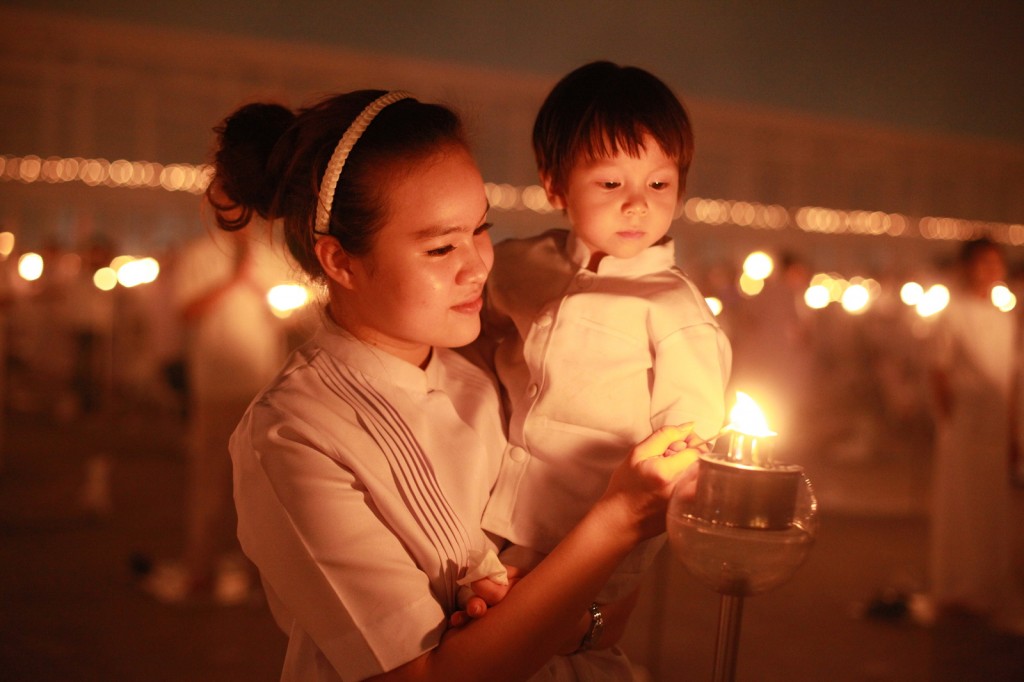Magha Puja Day The Light Of Peace Ceremony Wednesday, 7 March 2555 BE at Wat Phra Dhammakaya Pathum Thani Province, Thailand 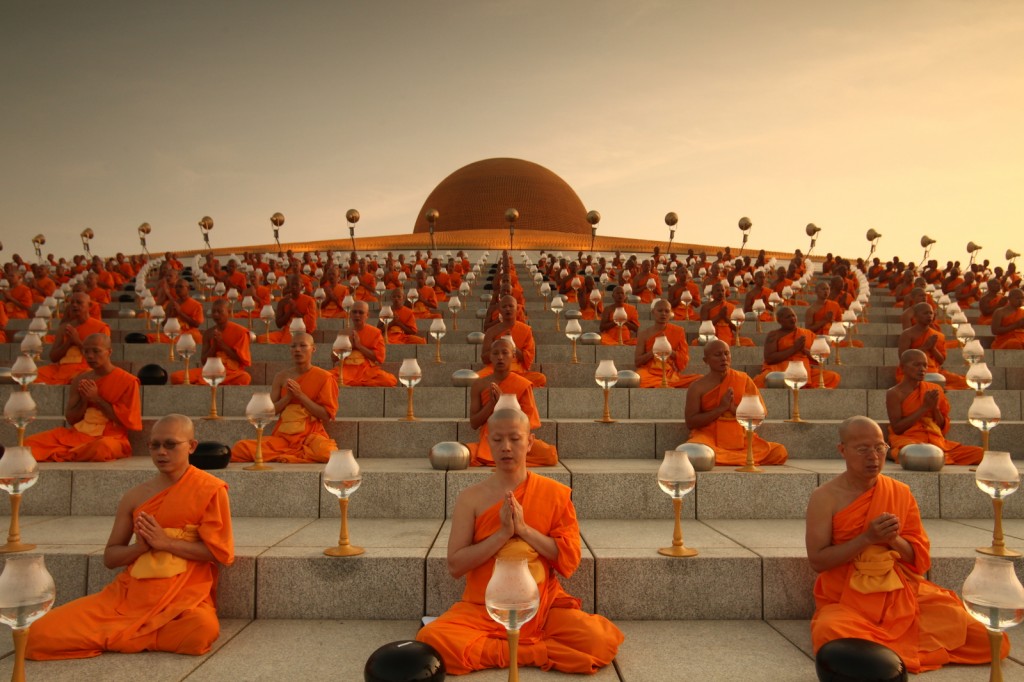 You are cordially invited to join the Magha Puja Day ceremony at Wat Phra Dhammakaya! Magha Puja Day is one of the most important Buddhist holy days in Thailand. Every temple across country holds ceremony to celebrate the occasion. The ceremony at Wat Phra Dhammakaya is one of the largest held in Thailand which main Light For Peace.
You are cordially invited to join the Magha Puja Day ceremony at Wat Phra Dhammakaya! Magha Puja Day is one of the most important Buddhist holy days in Thailand. Every temple across country holds ceremony to celebrate the occasion. The ceremony at Wat Phra Dhammakaya is one of the largest held in Thailand which main Light For Peace.
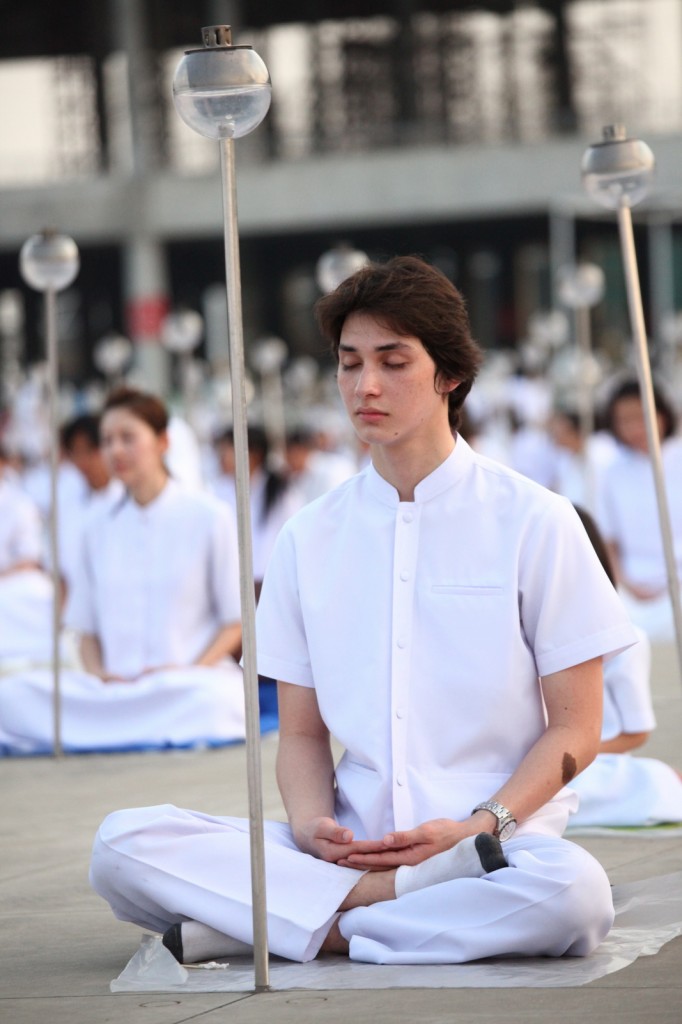 The Grand Meditation Square will be filled with 100,000 candle-lights to illuminate the light of peace of every participant.
The Grand Meditation Square will be filled with 100,000 candle-lights to illuminate the light of peace of every participant.
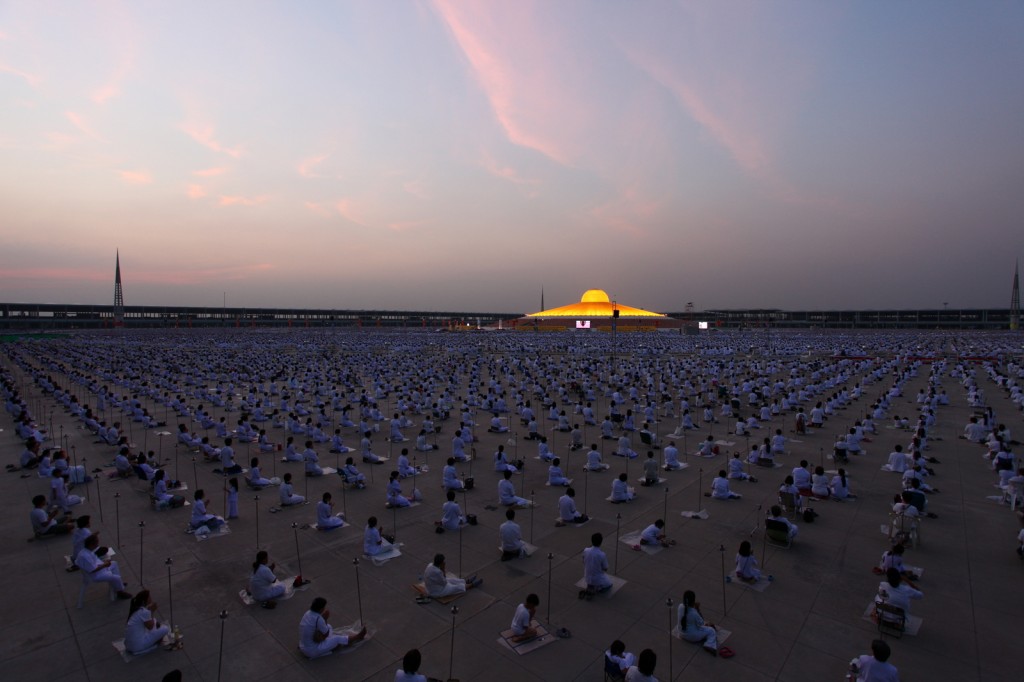 Nearly 200,000 people will practice meditation and spread their loving-kindness throughout the world in this fabulous full moon night.
Nearly 200,000 people will practice meditation and spread their loving-kindness throughout the world in this fabulous full moon night.
About 2,500 years ago, on the day of the full moon of the third lunar month, the Lord Buddha assembled with his disciple monks at Veluvana Bamboo Grove and following four marvelous events occurred:
- It was the day of the full moon. There were 1,250 Arahant monks who had gathered together without prior arrangement.
- All of them were Arahant (enlightened disciple monks) and all of them had been ordained by the Lord Buddha himself.
- The Lord Buddha delivered a sermon called the Ovada Patimokkha which includes the fundamental ideology, the moral standards and the conducts of Buddhism.
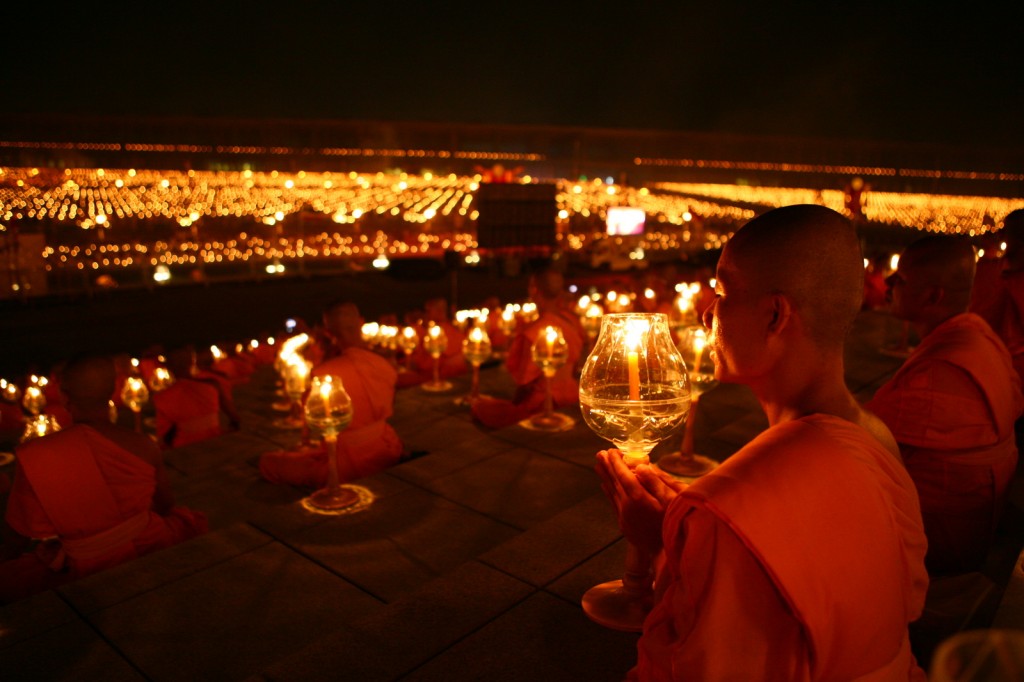 The Buddhist ideology is the ultimate objective of every Buddhist. As outlined in the Lord Buddha’s sermon, Buddhist ideology comprises the following:
The Buddhist ideology is the ultimate objective of every Buddhist. As outlined in the Lord Buddha’s sermon, Buddhist ideology comprises the following:
- We should be patient in order to reach our achievement. As our life may be burdened by suffering, we should be patient. Furthermore, patience toward sensual desire can prevent us from sensual indulgence.
- All the Lord Buddhas have taught that Nirvana is the state of supreme bliss.
- Monks who kill or harm other living beings do not deserve to be monks.
 Subsequently the Lord Buddha suggested the following moral standards:
Subsequently the Lord Buddha suggested the following moral standards:
- Abstaining from misdeeds because the Law of Karma still controls us. If we break precepts or commit bad deeds, karmic retribution will return to us either in this lifetime or during a future lifetime.
- Doing only good deeds. When the karma from good deeds bears fruit, our life will be joyful, prosperous and successful.
- Purifying our mind by practicing meditation. This is the only way that we are able to attain true happiness and Nirvana.
 Finally, he recommended the conducts which his disciples should obey.
Finally, he recommended the conducts which his disciples should obey.
- The propagation of Buddhism should be made without insulting or making slanderous allegations against each other.
- The propagation of Buddhism should be made without assaulting or harming each other.
- Buddhists should observe the precepts. In particular, Buddhist monks must observe all 227 precepts.
- One should be content in consuming food.
- One should live in a tranquil place which is suitable for meditation practice.
- One should always practice mindfulness even when standing, walking, sitting, or sleeping.
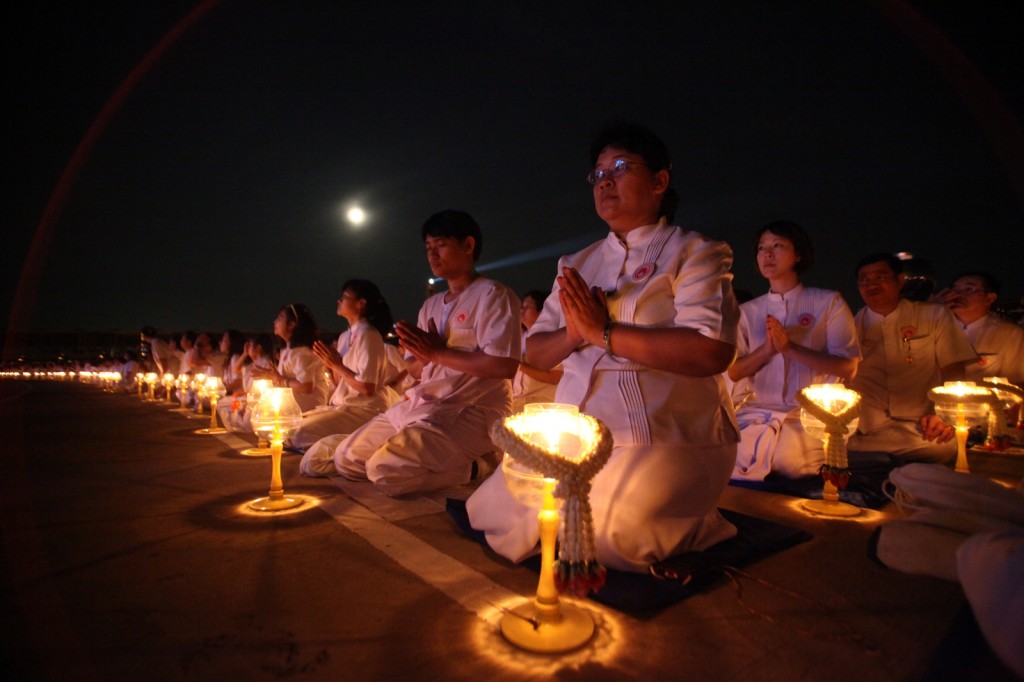 Lighting Lanterns to Cultivate Faith and Wisdom:
Lighting Lanterns to Cultivate Faith and Wisdom:
The light of faith and wisdom that we light up in homage to the Triple Gem represents our faithful heart with realization in the Lord Buddha’s virtues. We humbly offer the light to worship his compassion, purity and wisdom as he knew the truth of life thoroughly. Nothing could conceal his insight power. As we worship him with respect, we will receive merit in return. The merit from paying homage to the wholesome one will enable us to be prosperous and successful in our lives. The gift of light will allow us to have beautiful eyes, superb vision, beautiful radiance, a bright mind, luminous wisdom and, ultimately, attain the Buddhahood or Dhammakaya inside ourselves. 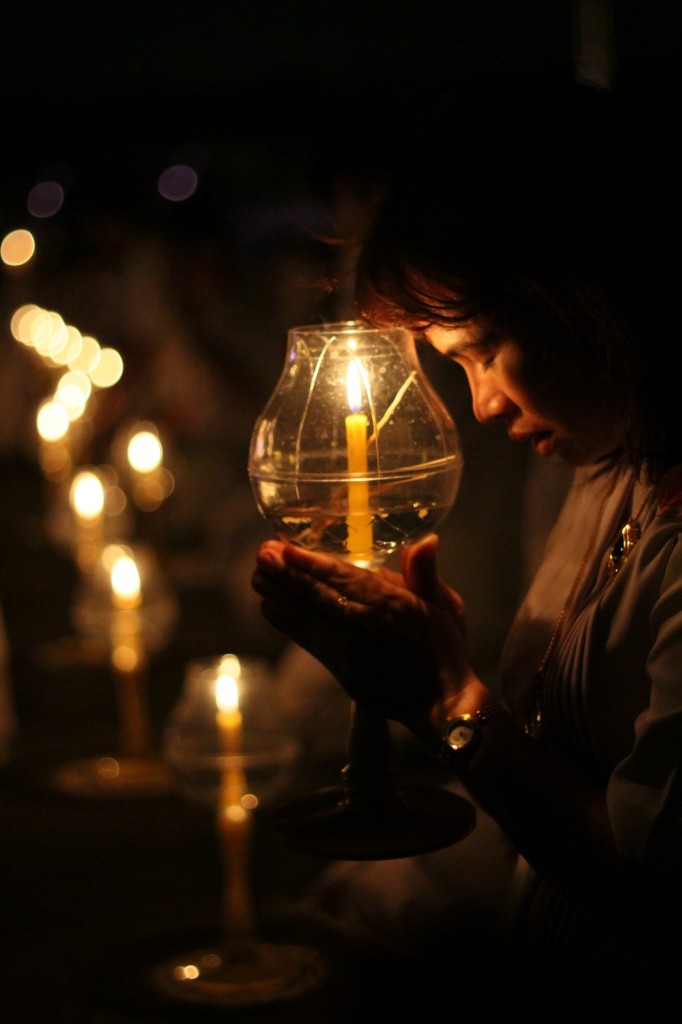 According to the Buddhist scripture, there was once a lady who faithfully lit lanterns to pay homage to the Lord Buddha. Later on, her good karma caused her to be reborn as a beautiful lady with a golden subtle complexion. Radiance glowed from her body constantly. Even when she was in the dark, she was able to see things because of her own radiance. After she ordained to become a Bhikkhuni (female Buddhist monk), she managed to attain enlightenment quickly and went on to become a female disciple monk who was recognized by the Lord Buddha as the one who was excellent in recalling past lifetimes. From this story, we can conclude that the act of worship to the Triple Gem is indeed the opportunity to develop our own mind by realizing and welcoming the wholesomeness of the Triple Gem into our own heart, similar to opening the lid of a crystal jar to receive drops of clean rain from the sky. We do not only believe in what we do, but we also understand why we do it. This is why the act of worship allows us to cultivate both faith and wisdom simultaneously.
According to the Buddhist scripture, there was once a lady who faithfully lit lanterns to pay homage to the Lord Buddha. Later on, her good karma caused her to be reborn as a beautiful lady with a golden subtle complexion. Radiance glowed from her body constantly. Even when she was in the dark, she was able to see things because of her own radiance. After she ordained to become a Bhikkhuni (female Buddhist monk), she managed to attain enlightenment quickly and went on to become a female disciple monk who was recognized by the Lord Buddha as the one who was excellent in recalling past lifetimes. From this story, we can conclude that the act of worship to the Triple Gem is indeed the opportunity to develop our own mind by realizing and welcoming the wholesomeness of the Triple Gem into our own heart, similar to opening the lid of a crystal jar to receive drops of clean rain from the sky. We do not only believe in what we do, but we also understand why we do it. This is why the act of worship allows us to cultivate both faith and wisdom simultaneously.


